

Dr. Karen’s (Partial) Rules of the Job Talk. I’ve been asked by many readers to write about the Job Talk.
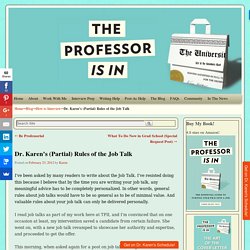
I’ve resisted doing this because I believe that by the time you are writing your job talk, any meaningful advice has to be completely personalized. In other words, general rules about job talks would have to be so general as to be of minimal value. The Professor Is In: How to Deliver a Halfway-Decent Job Talk. Want more advice from Karen Kelsky?
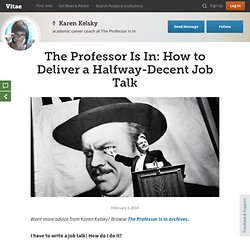
Browse The Professor Is In archives. I have to write a job talk! How do I do it? I have a post on job talks, called ”Dr. Karen's Rules of the Job Talk.” But more is needed. So here’s a simple checklist for your job talk: 1) Do you have a clear one-paragraph intro that lays out the topic and sketches the basic plan of the talk? 2) Do you resist the temptation to open with a vignette?
Cornell Post-Doctorate. Writing a Research Statement What is a research statement?
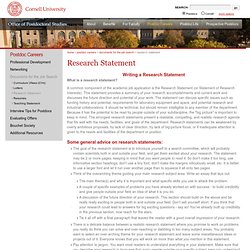
A common component of the academic job application is the Research Statement (or Statement of Research Interests). This statement provides a summary of your research accomplishments and current work and discusses the future direction and potential of your work. The statement can discuss specific issues such as funding history and potential, requirements for laboratory equipment and space, and potential research and industrial collaborations. It should be technical, but should remain intelligible to any member of the department. Some general advice on research statements: Do You Need Your Own Website While On The Job Market? [This is a guest post by Jentery Sayers, who recently completed his PhD at the University of Washington and is now an Assistant Professor of English at the University of Victoria.

He previously wrote on "Integrating Digital Audio Composition into Humanities Courses. " He is @jenterysayers on Twitter. --@jbj] Over at Crooked Timber back in June 2008, Eszter Hargittai wrote: “I’ve been continually surprised over the years about how many academics fail to take advantage of the Web as a medium for disseminating their work. This seems especially important in the case of those actively seeking a job in the near future.”
Of course, since 2008, various user-friendly avenues (e.g., Google profiles, Academia.edu, LinkedIn, RSS, and Twitter) have gained traction in the academic community, with many people relying quite heavily on them to share and learn about new research. Here, I do not want to repeat the advice Hargittai, Posner, Varner, and Croxall already provided. My answer is yes and no. Minding Your Manners for the Conference Interview - Manage Your Career. By David D.
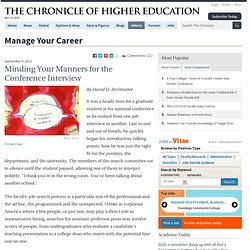
Perlmutter It was a heady time for a graduate student at his national conference as he rushed from one job interview to another. Late to one and out of breath, he quickly began his introductory talking points: how he was just the right fit for the position, the department, and the university. The members of the search committee sat in silence until the student paused, allowing one of them to interject politely: "I think you're in the wrong room.
You've been talking about another school. " Three Resources for Writing Letters of Recommendation. In addition to the work that flows naturally from a course–things like preparing, organizing the class, meeting with students, and grading–teaching also almost invariably involves an unrelated kind of work: writing letters of recommendation.
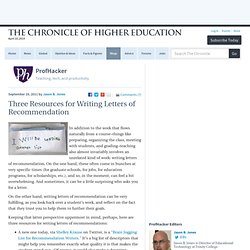
On the one hand, these often come in bunches at very specific times (for graduate schools, for jobs, for education programs, for scholarships, etc.), and so, in the moment, can feel a bit overwhelming. And sometimes, it can be a little surprising who asks you for a letter. On the other hand, writing letters of recommendation can be very fulfilling, as you look back over a student’s work, and reflect on the fact that they trust you to help them to further their goals. Keeping that latter perspective uppermost in mind, perhaps, here are three resources for writing letters of recommendations: A new one today, via Shelley Krause on Twitter, is a “Brain Jogging List for Recommendation Writers.” Return to Top. The Simple Secret To Identifying Your Strengths : Lifestyle. It's been told again and again: "Work on your strengths.

" You know this very well. But maybe the problem is that you don't know what your "r March 25, 2011 It’s been told again and again: “Work on your strengths.” You know this very well. I promise you that by the time you finish reading the next few paragraphs you will have a framework to do just that. First, let us see why it’s difficult to identity your “real” strengths. The wisdom therefore is becoming aware of this phenomenon (of strengths disappearing into your being), because once you know it you can put together a solution to “uncover” those strengths and bring them to the forefront. Let me give you three ideas to do just that: 1. 2. 3. Operating from an area of your strengths is fun and rewarding. Image Credit: Impact Visual Communications.